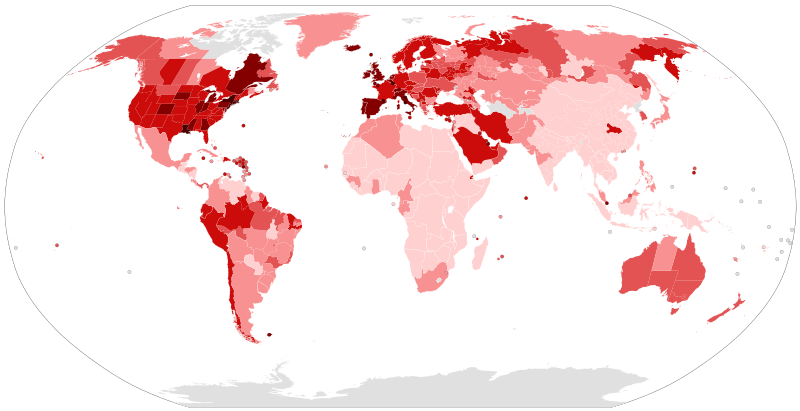From an Italian hotel to a US state, coronavirus ‘lawfare’ takes off

April 23: An avalanche of legal claims is about to descend on courts around the globe as people seek compensation for deaths and economic disruption caused by alleged failures to prevent the spread of Covid-19.
An Italian ski resort hotel, the US state of Missouri and others have already announced actions, despite doubts that pursuing financial redress will succeed and criticism that it is a means of redirecting blame, The Guardian reported.
The primary target has been China, reflecting widespread suspicions that Beijing failed initially to alert the World Heath Organisation to the outbreak and suppressed evidence.
Earlier this week, the attorney general of Missouri lodged a civil lawsuit in local courts against the Chinese government. The claim alleged that China arrested whistleblowers and concealed the contagious nature of coronavirus, leading to economic harm and loss of life in the US state.
“The impact of the virus is very real,” said Eric Schmitt, the state’s attorney general.
“Thousands have been infected and many have died, families have been separated from dying loved ones, small businesses are shuttering their doors, and those living paycheck to paycheck are struggling to put food on their table. The Chinese government … must be held accountable for their actions.”
Class actions have already been filed in other US courts by private groups pursuing damages, with the aim of recovering trillions of dollars in compensation from China.
“These lawsuits face significant legal challenges,” warned the London-based international law firm Volterra Fietta. “The US Foreign Sovereign Immunities Act of 1976 strictly limits the possibility of suing foreign states and their agencies before US courts.
“The principle of foreign state immunity is widely recognised in international law – the vast majority of states have enacted legislation that provides for sovereign immunity.”
In Italy, a ski resort hotel in the Dolomites presented a subpoena to a local court seeking compensation from China’s health ministry for its loss of business. The hotel was fully booked for the season, including the period of 18-22 March, when the Alpine Ski World Cup had been due to take place.
“The early and sudden closure led to disastrous consequences, including the dismissal of all staff and the cancellation of contracts with suppliers,” Marco Vignola, the lawyer representing the hotel, told Italian media.
ONEurope Onlus, which organises projects to help immigrants integrate in Italy, has backed the action. Codacons, the Italian consumers’ association, is evaluating possible class action against the Chinese government through US courts.
Dr Luis Eslava, an international law expert at the University of Kent, said: “Joining a wave of accusations [against] China for a pandemic that has infected about 3 million people and taken the lives of almost 200,000 worldwide, Missouri’s lawsuit is symptomatic of a wider and well-documented trend in the use of law as a political tool in the US and around the world.
“Blaming China for our current predicament, now using legal means, is a reticence to take a harder road: local leaders accepting political responsibility for decades of undermining public health systems, while building a more socially inclusive and resilient global order.”
The Chinese ambassador to the UK on Thursday dismissed the legal claims as reminiscent of 19th-century European colonial wars. “This disinformation about China covering up, about China hiding something – this is not true,” Liu Xiaoming said.
“The Chinese government was transparent and very quick to share data. Some other countries, their local courts sued China – it is absurd,” he said. “Some politicians, some people, want to play at being the world’s policeman – this is not the era of gunboat diplomacy, this is not the era when China was a semi-colonial, semi-feudal society.”
China is not the only target. The blizzard of legal activity includes claims by hundreds of tourists against local authorities in the Austrian ski resort of Ischgl, accusing the authorities of exposing the tourists to the virus. Austria’s consumer protection association alleges that the resort was kept open despite the risk to skiers.
Günther Platter, the governnor of Tyrol state, has said all decisions were taken “together with experts on the basis of the existing knowledge”.
In other contexts, commentators have devised the term “lawfare” to denigrate claims deemed to be misusing legal principles to pursue political aims through courts. Such accusations may surface in the months to come.
While many lawyers around the world are enduring enforced idleness due to Covid-19 restrictions, they could soon be busy. Those sued may well invoke the legal principle of force majeure – that extraordinary events alter parties’ obligations.
Apprehension over the scale of claims about to hit courts has already prompted the Medical Defence Union, which represents many UK doctors, to suggest that legal immunity might be granted to medics risking their lives during the pandemic.
Several US states, including New York, New Jersey and Michigan, have adopted laws that provide healthcare professionals and hospitals with “immunity from civil liability for any injury or death alleged to have been sustained because of any acts or omissions undertaken in good faith” during the crisis.
Sign up for our weekly newsletter to stay up to date on our product, events featured blog, special offer and all of the exciting things that take place here at Legitquest.




Add a Comment